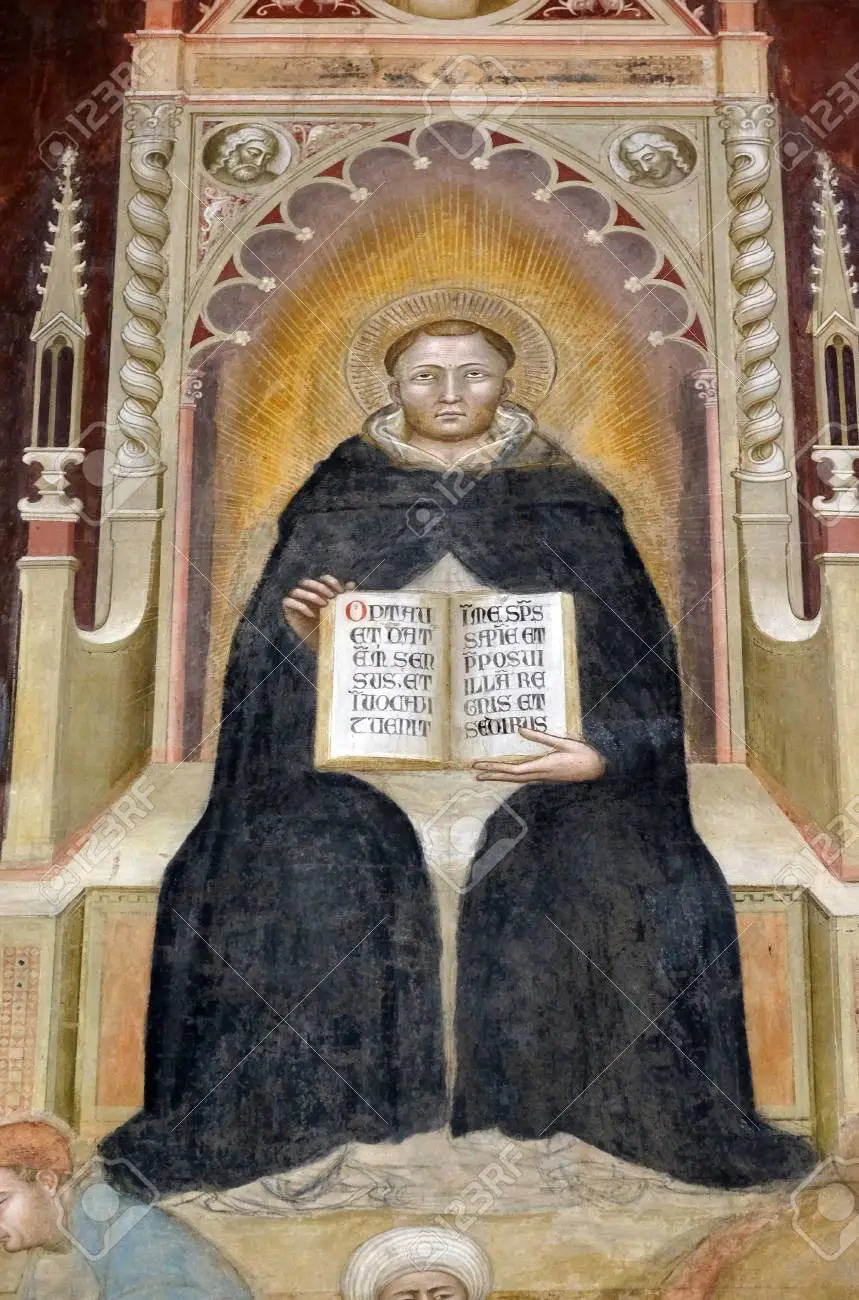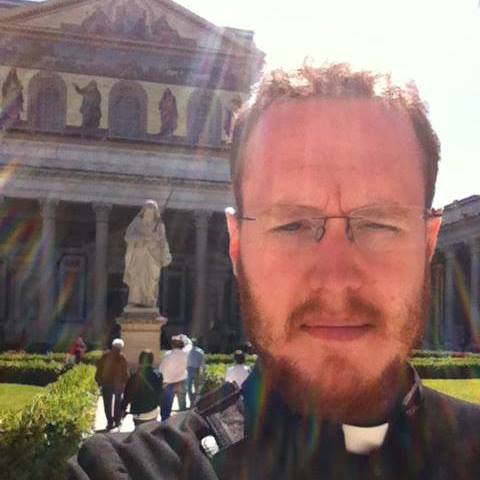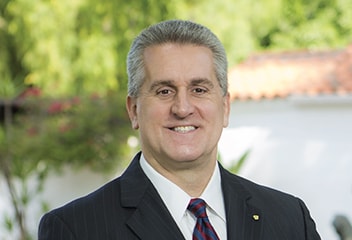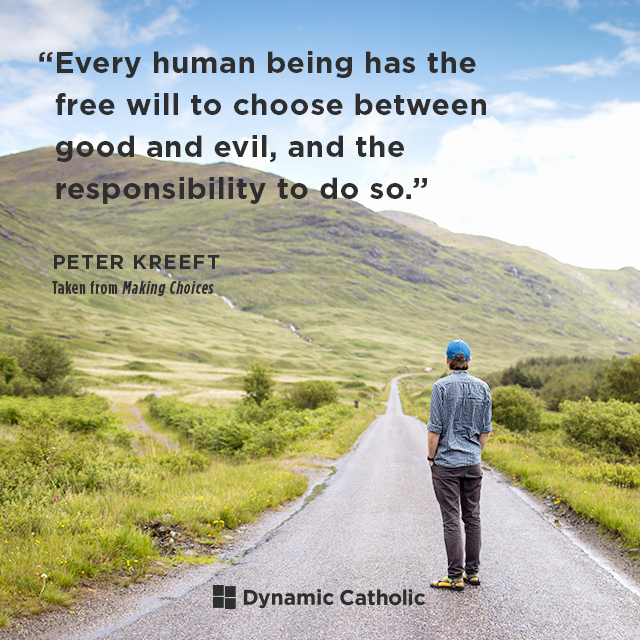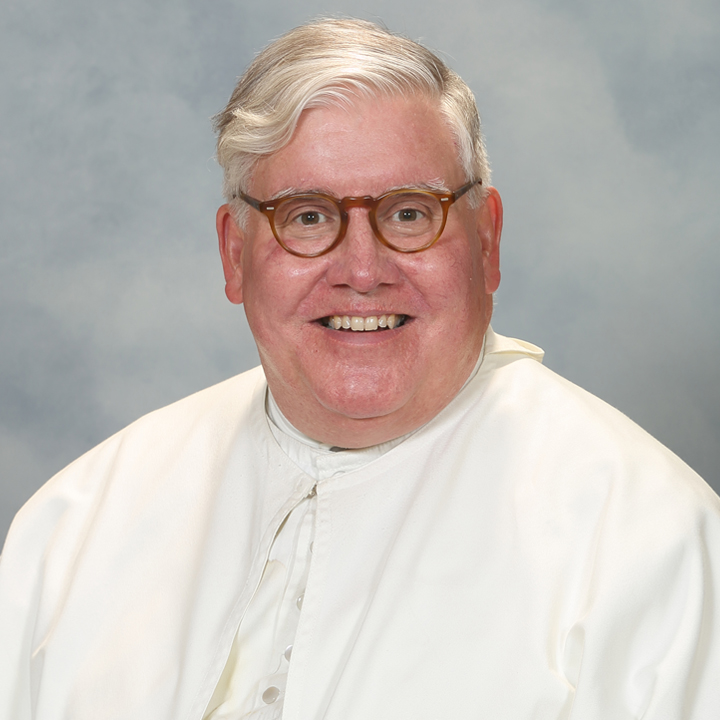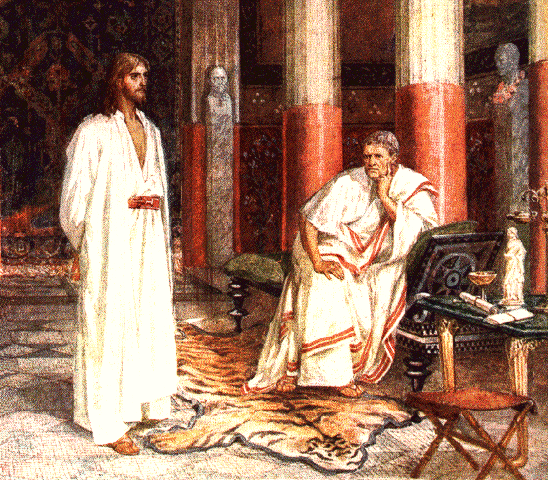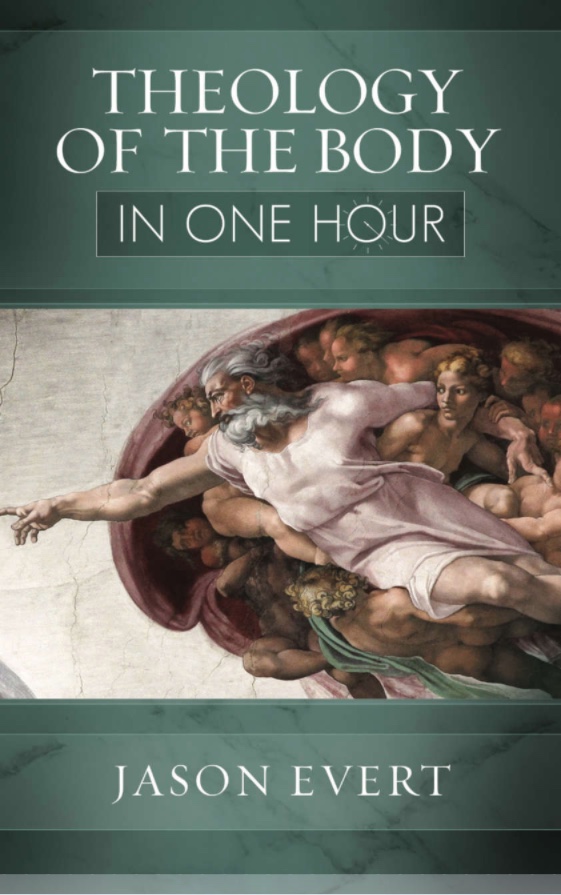
“Before retiring to bed on a Tuesday night in the Vatican, Saint John Paul II prayed the Liturgy of the Hours, meditating upon the following words from Saint Peter: “Stay sober and alert. Your opponent the devil is prowling like a roaring lion looking for someone to devour.” 1
Long after others in the papal apartment were asleep, a noise awoke his secretary, Monsignor Stanisław Dziwisz, who left his room to investigate. His room was adjacent to the Holy Father’s, but he noticed that the sounds were not coming from the Pope’s room, but from his chapel. Although late-night prayer was not uncommon for John Paul, Dziwisz peered in to be certain that everything was all right.
The sight was typical: John Paul immersed in contemplation alone before the tabernacle. The Pope usually spoke to God with very simple words, and often prayed during adoration like Jesus did in Gethsemane, talking with his Father. 2 This night, Dziwisz noticed that John Paul indeed seemed troubled. The disturbance he overheard was the Pope speaking aloud to God, asking repeatedly, “Dlaczego? Dlaczego?” (“ Why? Why?”). Out of reverence, the monsignor backed away from the chapel and returned to his room for the night.
John Paul celebrated Mass the next morning, but was unusually reserved during breakfast afterward. The Pope’s typical jovial and engaging demeanor toward the sisters and guests was subdued. Instead of asking questions and conversing about an endless variety of topics, he was recollected and withdrawn. He ate no breakfast, and drank a cup of tea. 3
That afternoon would be an important one: During his Wednesday audience, John Paul was preparing to announce the establishment of two ministries in the Church that would address the problems facing families in the modern world. 4 One of these, the Pontifical Institute for Studies on Marriage and the Family, would become the main teaching arm of the Theology of the Body. 5
On his way to deliver his message, the Holy Father rode in the Popemobile across Saint Peter’s Square. As he was blessing children and greeting the crowds, gunshots from a Turkish assassin rang out. An ambulance rushed the Pope in his bloodstained cassock to the hospital, where he narrowly escaped death.
Had God given him a premonition of his suffering the night before? The answer to that question will likely remain a mystery known only to John Paul.
Was there a link between his suffering and his efforts to build up marriage and the family? This he affirmed, saying, “Perhaps there was a need for that blood to be spilled in Saint Peter’s Square.” 6 He added, “Precisely because the family is threatened, the family is being attacked. So the Pope must be attacked. The Pope must suffer, so that the world may see that there is a higher gospel, as it were, the gospel of suffering, by which the future is prepared, the third millennium of families. . . .” 7
…While camping at the World Youth Day vigil in Kraków, I spoke with a young woman who was preparing to enter her first year of college at a prestigious university in California. She pulled her phone out of her backpack and showed me where her online college application required her to check the appropriate box to indicate her gender.
There were eighteen boxes to choose from.
I read through the litany of genders, and noticed that two were missing: male and female. (Facebook— which invites its users to identify as one of more than fifty genders— at least offers them the possibility of choosing to be male or female.) The university application, however, did allow the incoming students to choose “cis-male” or “cis-female,” which means that the biological sex one was “assigned” at birth aligns with the gender one chooses for one’s identity.
While some seek to expand upon the number of genders and create a spectrum of options, the ultimate goal of gender theory is not diversity. After all, diversity requires objective differences. The goal is to erase the sexual difference, and thus to eliminate the meaning of the body.
Where is this coming from? The Second Vatican Council prophesied our culture’s sexual identity crisis by stating, “When God is forgotten . . . the creature itself grows unintelligible.” 8 Although the Theology of the Body was written before many of the modern ideas of gender theory became popular, it was ahead of its time in offering a clear answer for them— and for many other key issues about sexuality and the body.
What is the Theology of the Body?
The Theology of the Body is the popular title given to 135 reflections written by Saint John Paul II. As a cardinal in Poland, he (Karol Wojtyła) planned to publish them as a book titled Man and Woman He Created Them. 9 Before this could happen, he was elected pope, and instead delivered the content in 129 Wednesday Audiences during the first five years of his pontificate.
The thousands of vacationers and pilgrims who gathered to see the Holy Father at these audiences had no idea that the Pope’s biographer would later describe the Theology of the Body as a “theological time bomb set to go off, with dramatic consequences, sometime in the third millennium of the Church.” 10
What could be so explosive about a Polish bishop’s theological reflections on the body? To answer this, consider how the human body has been viewed throughout history. Thousands of years ago, Gnostics and Platonists believed that a person’s true self was different from his or her body. One Gnostic sect, the Manicheans, believed that man’s destiny was to set his spiritual essence free from the pollution of matter. Because the body was material, it was not only inferior, but evil. In fact, it was considered a sin for a woman to give birth because she was bringing more matter into existence! Centuries later, puritanism considered the body to be a threat to one’s soul. Meanwhile, the philosopher René Descartes proposed that the soul is like a ghost trapped in a machine.
All these views about the body have one element of truth in common: Our bodies and souls aren’t in harmony. However, the body is not unimportant compared to the soul. Nor is the body something we “have,” or something that encumbers our soul. We are our bodies, and our bodies reveal us. However, our current state is not the way God created us in the beginning. The discord that exists within man is the result of original sin. 11
While some individuals devalued the body and cared only for the soul, others fell into the opposite mistake. Atheists and materialist philosophers argued that the human person is nothing more than his or her body: There is no soul, and the body has no meaning.
Although these ideas might seem like debates reserved for philosophers and theologians, consider what happens when entire cultures accept these misguided notions of what it means to be human. If man has a body but no spiritual dimension, what distinguishes him from other animals? Why should he act differently or be treated differently? On the other hand, if a person’s true identity is found in his spirit alone, then man’s view of himself becomes uprooted from any objective reality. Truth would then be defined by a person’s feelings. As a result, masculinity and femininity would be viewed as social constructs, not realities created by God. But if masculinity and femininity don’t exist, then what becomes of marriage and the family?
Because there has been so much confusion about the meaning of the human body, John Paul set out to present a total vision of man that would include man’s origin, history, and destiny. Instead of arguing from the outside in, offering people a litany of rules, he invited them to seek the truth about reality by reflecting on their own human experience. The writings of Saint John of the Cross played a key role in shaping John Paul’s style of thinking. His philosophical studies on of Max Scheler and other phenomenologists further sharpened his ability to observe human experience. John Paul doesn’t begin by explaining what man ought to do, but by explaining who man is. In the Pope’s mind, people will know how to live if they know who they are.
It has been said that rules without a relationship creates rebellion. This is true with parents and children, and it’s especially true with the relationship between God and humanity. John Paul knew that laws don’t change hearts. When people view morality as a rigid list of imposed regulations, they might temporarily behave themselves out of guilt or fear, but they often abandon the faith. The Pope understood the futility of this approach, and knew that a fresh re-presentation of the Church’s teachings on sexual ethics was overdue.
What the modern world needed was not just a defense of the Church’s teachings, but rather an unveiling of God’s original plan for the beauty of human love. Culture needed something that wasn’t simply intellectually convincing or morally upright, but rather something that corresponded to the deepest yearnings of the human heart.
Unfortunately, many have grown deaf to these yearnings and hear only the urges of the body. But no matter how numb one might be to the deepest aspirations of the soul, everyone can relate to the ache of solitude, the experience of shame, and the desire for communion. In the Theology of the Body, John Paul explored these experiences and more, to reveal how God’s plan for humanity is stamped not only into our hearts, but also into our bodies.
When people discover the Theology of the Body, they often exclaim that they’ve never heard anything like it before. This is because many people learned about sexuality in a religious framework that focused only on what is forbidden and permitted. Others learned about it through the lens of modern sex education, which reduces one’s sexuality to biology and sensuality. This might count as “sex ed,” but it’s not a true education in human sexuality. 12
Properly speaking, “sex” is not something people do. Sex is who we are as male and female persons. The Theology of the Body reminds us of this broader meaning and offers compelling answers to questions such as: Who am I? What does it mean to be human? How should I live? It delves into delicate questions regarding marriage and sexual ethics, but does so while inviting people to rediscover the meaning of life. Through it, one realizes that modern man’s sexual confusion is not caused because the world glorifies sexuality, but because the world fails to see its glory.
For those who have disregarded the Church’s teaching on human sexuality because it seems out of touch with the modern world, the Theology of the Body offers a fresh perspective. Its insights are not pious reflections offered by a theologian who was isolated from the daily struggles of married life. On the contrary, they are the result of decades of personal interactions between a remarkable saint and the countless young adults and married couples that he accompanied through their vocations. These couples attest that although John Paul had a great ability to preach, he had an even greater ability to listen.
The Theology of the Body comes from the heart of a saint who listened intently not only to others but also to the God Who could provide meaning to their lives. He was no stranger to suffering, living under Nazi and Communist regimes and having lost his family by the age of twenty. While such trials might lead some to abandon their faith, John Paul’s was forged by them, as he sought answers to the deepest questions about life’s meaning.
John Paul also possessed a staggering intellect, and according to his secretary, spent three hours each day reading. 13 Although he was dedicated to the intellectual life, John Paul’s prayer life took priority. His colleagues attest that he seemed to be continually absorbed in prayer, as can be seen from the fact that he considered the busy Paris Metro to be “a superb place for contemplation.” 14
His greatest devotion, however, was to the Blessed Sacrament. He never omitted his Holy Hour on Thursdays, even while traveling internationally. If the organizers of his trips didn’t make room for it in his schedule, he would make time and simply arrive an hour late to their program. When his assistants attempted to convince him to decrease the amount of time spent in this devotion, he refused, saying, “No, it keeps me.” 15 He knew that apostolic mission derives its strength from life in God. 16 It is from this man’s heart, mind, and soul that the Church has been given a tremendous gift: the Theology of the Body.
Structure
The Theology of the Body is comprised of two parts. The first focuses on three passages from Scripture, or “words” of Christ. In it, John Paul examined the dialogue between Jesus and the Pharisees regarding marriage and divorce. 17 Then he reflects upon the words of Christ from the Sermon on the Mount, in particular those concerning committing adultery in one’s heart. 18 Finally, he turns to Christ’s words regarding the resurrection of the body. 19 By means of these reflections, he explains the redemption of the body. If fact, in his final catechesis, he describes the content of the whole work as “the redemption of the body and the sacramentality of marriage.” 20
The Theology of the Body is thoroughly biblical— as can be seen by the fact that the Pope draws from forty-six books and more than a thousand Scripture citations. However, among all of the passages he quotes, the three mentioned above are his focus. He compares them to the panels of a triptych, which is a work of sacred art consisting of three panels, or parts. When the three images are displayed together, they present a fuller understanding of a topic of theology (in this case, the human person).
The three parts of John Paul’s triptych are original, historical, and eschatological man. Original man is who God created man to be in the beginning, before the dawn of sin. Historical man refers to the current state of humanity, burdened by original sin but redeemed by Christ. “Eschatological” has its roots in the Greek word for “end,” eschaton, and refers to the glorified state of man in heaven. Together, these three epochs of human history form what John Paul called an “adequate anthropology”— an understanding of what it means to be a human person.
In the first part of the Theology of the Body, John Paul used the above three “words” of Christ to explain man’s call to live out “the spousal meaning of the body.” This phrase is the heart of the Theology of the Body. It means that the human body has “the power to express love: precisely that love in which the human person becomes a gift and— through this gift— fulfills the very meaning of his being and existence.” 21 (This gift of self can be expressed not only through marriage, but also through celibacy for the kingdom of God.)
In the second part of the Theology of the Body, the Pope analyzed “The Sacrament” which is the “great sign” of Christ’s love for the Church and the love between a husband and wife. He explained what the gift of self means in terms of the “language of the body,” and how men and women are called to live it out, especially as it relates to building their families.”
-Evert, Jason (2017-12-06). Theology of the Body In One Hour (Kindle Locations 63-102, 109-239). Totus Tuus Press. Kindle Edition.
Catechism of the Catholic Church
Sexual Identity
(CCC 2333) “Everyone, man and woman, should acknowledge and accept his sexual identity. Physical, moral, and spiritual difference and complementarity are oriented toward the goods of marriage and the flourishing of family life. The harmony of the couple and of society depends in part on the way in which the complementarity, needs, and mutual support between the sexes are lived out.”
(CCC 2393) “By creating the human being man and woman, God gives personal dignity equally to the one and the other. Each of them, man and woman, should acknowledge and accept his sexual identity.”
Body and Soul
(CCC 364) “The human body shares in the dignity of “the image of God”: it is a human body precisely because it is animated by a spiritual soul, and it is the whole human person that is intended to become, in the body of Christ, a temple of the Spirit:
Man, though made of body and soul, is a unity. Through his very bodily condition he sums up in himself the elements of the material world. Through him they are thus brought to their highest perfection and can raise their voice in praise freely given to the Creator. For this reason man may not despise his bodily life. Rather he is obliged to regard his body as good and to hold it in honor since God has created it and will raise it up on the last day.”
Pope Francis
Encyclical letter Laudato Si’ (2015)
(# 155) “Human ecology also implies another profound reality: the relationship between human life and the moral law, which is inscribed in our nature and is necessary for the creation of a more dignified environment. Pope Benedict XVI spoke of an ‘ecology of man’, based on the fact that ‘man too has a nature that he must respect and that he cannot manipulate at will’. It is enough to recognize that our body itself establishes us in a direct relationship with the environment and with other living beings. The acceptance of our bodies as God’s gift is vital for welcoming and accepting the entire world as a gift from the Father and our common home, whereas thinking that we enjoy absolute power over our own bodies turns, often subtly, into thinking that we enjoy absolute power over creation. Learning to accept our body, to care for it and to respect its fullest meaning, is an essential element of any genuine human ecology. Also, valuing one’s own body in its femininity or masculinity is necessary if I am going to be able to recognize myself in an encounter with someone who is different. In this way we can joyfully accept the specific gifts of another man or woman, the work of God the Creator, and find mutual enrichment. It is not a healthy attitude which would seek to cancel out sexual difference because it no longer knows how to confront it.”
(# 56) “Yet another challenge is posed by the various forms of an ideology of gender that ‘denies the difference and reciprocity in nature of a man and a woman and envisages a society without sexual differences, thereby eliminating the anthropological basis of the family. This ideology leads to educational programs and legislative enactments that promote a personal identity and emotional intimacy radically separated from the biological difference between male and female. Consequently, human identity becomes the choice of the individual, one which can also change over time.’ It is a source of concern that some ideologies of this sort, which seek to respond to what are at times understandable aspirations, manage to assert themselves as absolute and unquestionable, even dictating how children should be raised. It needs to be emphasized that ‘biological sex and the socio-cultural role of sex (gender) can be distinguished but not separated.’ …It is one thing to be understanding of human weakness and the complexities of life, and another to accept ideologies that attempt to sunder what are inseparable aspects of reality. Let us not fall into the sin of trying to Updated August 7, 2019 3 replace the Creator. We are creatures, and not omnipotent. Creation is prior to us and must be received as a gift. At the same time, we are called to protect our humanity, and this means, in the first place, accepting it and respecting it as it was created.”
(# 285) “Beyond the understandable difficulties which individuals may experience, the young need to be helped to accept their own body as it was created, for ‘thinking that we enjoy absolute power over our own bodies turns, often subtly, into thinking that we enjoy absolute power over creation… An appreciation of our body as male or female is also necessary for our own self-awareness in an encounter with others different from ourselves. In this way we can joyfully accept the specific gifts of another man or woman, the work of God the Creator, and find mutual enrichment.’ Only by losing the fear of being different, can we be freed of self-centeredness and self-absorption. Sex education should help young people to accept their own bodies and to avoid the pretension ‘to cancel out sexual difference because one no longer knows how to deal with it.’
(# 286) “Nor can we ignore the fact that the configuration of our own mode of being, whether as male or female, is not simply the result of biological or genetic factors, but of multiple elements having to do with temperament, family history, culture, experience, education, the influence of friends, family members and respected persons, as well as other formative situations. It is true that we cannot separate the masculine and the feminine from God’s work of creation, which is prior to all our decisions and experiences, and where biological elements exist which are impossible to ignore. But it is also true that masculinity and femininity are not rigid categories. It is possible, for example, that a husband’s way of being masculine can be flexibly adapted to the wife’s work schedule. Taking on domestic chores or some aspects of raising children does not make him any less masculine or imply failure, irresponsibility or cause for shame. Children have to be helped to accept as normal such healthy ‘exchanges’ which do not diminish the dignity of the father figure. A rigid approach turns into an over accentuation of the masculine or feminine, and does not help children and young people to appreciate the genuine reciprocity incarnate in the real conditions of matrimony. Such rigidity, in turn, can hinder the development of an individual’s abilities, to the point of leading him or her to think, for example, that it is not really masculine to cultivate art or dance, or not very feminine to exercise leadership. This, thank God, has changed, but in some places deficient notions still condition the legitimate freedom and hamper the authentic development of children’s specific identity and potential.”
Address to Priests, Religious, Seminarians and Pastoral Workers during the Apostolic Journey to Georgia and Azerbaijan (October 1, 2016)
“You mentioned a great enemy to marriage today: the theory of gender. Today there is a world war to destroy marriage. Today there are ideological colonizations which destroy, not with weapons, but with ideas. Therefore, there is a need to defend ourselves from ideological colonizations.”
Address to the Polish Bishops during the Apostolic Journey to Poland (July 27, 2016)
“In Europe, America, Latin America, Africa, and in some countries of Asia, there are genuine forms of ideological colonization taking place. And one of these – I will call it clearly by its name – is [the ideology of] ‘gender’. Today children – children! – are taught in school that everyone can choose his or her sex. Why are they teaching this? Because the books are provided by the persons and institutions that give you money. These forms of ideological colonization are also supported by influential countries. And this terrible! “In a conversation with Pope Benedict, who is in good health and very perceptive, he said to me: ‘Holiness, this is the age of sin against God the Creator’. He is very perceptive. God created man and woman; God created the world in a certain way… and we are doing the exact opposite. God gave us things in a ‘raw’ state, so that we could shape a culture; and then with this culture, we are shaping things that bring us back to the ‘raw’ state! Pope Benedict’s observation should make us think. ‘This is the age of sin against God the Creator’. That will help us.”
Address to Équipes de Notre Dame (September 10, 2015)
“This mission which is entrusted to them, is all the more important inasmuch as the image of the family — as God wills it, composed of one man and one woman in view of the good of the spouses and also of the procreation and upbringing of children — is deformed through powerful adverse projects supported by ideological trends.”
Address to the Bishops of Puerto Rico (June 8, 2015)
“The complementarity of man and woman, the pinnacle of divine creation, is being questioned by the so-called gender ideology, in the name of a more free and just society. The differences between man and woman are not for opposition or subordination, but for communion and generation, always in the ‘image and likeness’ of God.” Full text General Audience on Man and Woman (April 15, 2015) “For example, I ask myself, if the so-called gender theory is not, at the same time, an expression of frustration and resignation, which seeks to cancel out sexual difference because it no longer knows how to confront it. Yes, we risk taking a step backwards. The removal of difference in fact creates a problem, not a solution.”
Address in Naples (March 23, 2015)
“The crisis of the family is a societal fact. There are also ideological colonializations of the family, different paths and proposals in Europe and also coming from overseas. Then, there is the mistake of the human mind — gender theory — creating so much confusion.”
Meeting with Families in Manila (January 16, 2015)
“Let us be on guard against colonization by new ideologies. There are forms of ideological colonization which are out to destroy the family.”
Pope Benedict XVI
Encyclical letter Deus Caritas Est (2005)
(# 5) “Yet the contemporary way of exalting the body is deceptive. Eros, reduced to pure ‘sex’, has become a commodity, a mere ‘thing’ to be bought and sold, or rather, man himself becomes a commodity. This is hardly man’s great ‘yes’ to the body. On the contrary, he now considers his body and his sexuality as the purely material part of himself, to be used and exploited at will.”
(# 11) “While the biblical narrative does not speak of punishment, the idea is certainly present that man is somehow incomplete, driven by nature to seek in another the part that can make him whole, the idea that only in communion with the opposite sex can he become ‘complete’… Eros is somehow rooted in man’s very nature; Adam is a seeker, who ‘abandons his mother and father’ in order to find woman; only together do the two represent complete humanity and become ‘one flesh’. The second aspect is equally important. From the standpoint of creation, eros directs man towards marriage, to a bond which is unique and definitive; thus, and only thus, does it fulfill its deepest purpose. Corresponding to the image of a monotheistic God is monogamous marriage.”
Address to the Pontifical Council “Cor Unum” (January 19, 2013)
“The Christian vision of man is, in fact, a great ‘yes’ to the dignity of persons called to an intimate filial communion of humility and faithfulness. The human being is not a self-sufficient individual nor an anonymous element in the group. Rather he is a unique and unrepeatable person, intrinsically ordered to relationships and sociability. Thus the Church reaffirms her great ‘yes’ to the dignity and beauty of marriage as an expression of the faithful and generous bond between man and woman, and her no to ‘gender’ philosophies, because the reciprocity between male and female is an expression of the beauty of nature willed by the Creator.”
Address to the Roman Curia (December 21, 2012)
“These words lay the foundation for what is put forward today under the term ‘gender’ as a new philosophy of sexuality. According to this philosophy, sex is no longer a given element of nature that man has to accept and personally make sense of: it is a social role that we choose for ourselves, while in the past it was chosen for us by society. The profound falsehood of this theory and of the anthropological revolution contained within it is obvious. People dispute the idea that they have a nature, given by their bodily identity, that serves as a defining element of the human being. They deny their nature and decide that it is not something previously given to them, but that they make it for themselves.”
Address to the German Bundestag (September 22, 2011)
“…There is also an ecology of man. Man too has a nature that he must respect and that he cannot manipulate at will. Man is not merely self-creating freedom. Man does not create himself. He is intellect and will, but he is also nature, and his will is rightly ordered if he respects his nature, listens to it and accepts himself for who he is, as one who did not create himself. In this way, and in no other, is true human freedom fulfilled.”
Pope St. John Paul II
Letter to Families (1994)
(# 6) “Man is created ‘from the very beginning’ as male and female: the light of all humanity… is marked by this primordial duality. From it there derive the ‘masculinity’ and the ‘femininity’ of individuals, just as from it every community draws its own unique richness in the mutual fulfillment of persons… Hence one can discover, at the very origins of human society, the qualities of communion and of complementarity.”
(# 19) “…the human family is facing the challenge of a new Manichaeanism, in which body and spirit are put in radical opposition; the body does not receive life from the spirit, and the spirit does not give life to the body. Man thus ceases to live as a person and a subject. Regardless of all intentions and declarations to the contrary, he becomes merely an object. This neo-Manichaean culture has led, for example, to human sexuality being regarded more as an area for manipulation and exploitation than as the basis of that primordial wonder which led Adam on the morning of creation to exclaim before Eve: ‘This at last is bone of my bones and flesh of my flesh’ (Gen 2:23).”
Theology of the Body
Pope John Paul II, Man and Woman He Created Them: A Theology of the Body, trans. Michael Waldstein (Boston: Pauline Books & Media, 2006)
(# 9:3) “The account of the creation of man in Genesis 1 affirms from the beginning and directly that man was created in the image of God inasmuch as he is male and female… man became the image of God not only through his own humanity, but also through the communion of persons, which man and woman form from the very beginning.”
(# 9:5) “Masculinity and femininity express the twofold aspect of man’s somatic constitution… and indicate, in addition… the new consciousness of the meaning of one’s body. This meaning, one can say, consists in reciprocal enrichment.”
(# 10:1) “Femininity in some way finds itself before masculinity, while masculinity confirms itself through femininity. Precisely the function of sex [that is, being male or female], which in some way is ‘constitutive for the person’ (not only ‘an attribute of the person’), shows how deeply man, with all his spiritual solitude, with the uniqueness and unrepeatability proper to the person, is constituted by the body as ‘he’ or ‘she’.”
(# 14:4) “The body, which expresses femininity ‘for’ masculinity and, vice versa, masculinity ‘for’ femininity, manifests the reciprocity and the communion of persons.”
Congregation for the Doctrine of the Faith Letter on the Collaboration of Men and Women in the Church and in the World (2004)
(# 2) “In this perspective [i.e., that of gender ideology], physical difference, termed sex, is minimized, while the purely cultural element, termed gender, is emphasized to the maximum and held to be primary. The obscuring of the difference or duality of the sexes has enormous consequences on a variety of levels. This theory of the human person, intended to promote prospects for equality of women through liberation from biological determinism, has in reality inspired ideologies which, for example, call into question the family, in its natural two-parent structure of mother and father, and make homosexuality and heterosexuality virtually equivalent, in a new model of polymorphous sexuality.”
(# 12) “Male and female are thus revealed as belonging ontologically to creation and destined therefore to outlast the present time, evidently in a transfigured form.”
Persona Humana: Declaration on Certain Questions Concerning Sexual Ethics (1975)
(III) “… There can be no true promotion of man’s dignity unless the essential order of his nature is respected.”
Congregation for Catholic Education
“Male and Female He Created Them”: Towards a Path of Dialogue on the Question of Gender Theory in Education (2019)
(# 1) “It is becoming increasingly clear that we are now facing with what might accurately be called an educational crisis, especially in the field of affectivity and sexuality. In many places, curricula are being planned and implemented which “allegedly convey a neutral conception of the person and of life, yet in fact reflect an anthropology opposed to faith and to right reason”. The disorientation regarding anthropology which is a widespread feature of our cultural landscape has undoubtedly helped to destabilize the family as an institution, bringing with it a tendency to cancel out the differences between men and women, presenting them instead as merely the product of historical and cultural conditioning.” ** This entire document deals with gender theory and education. The above is the first paragraph.
Compendium of the Social Doctrine of the Church
(# 224) “Faced with theories that consider gender identity as merely the cultural and social product of the interaction between the community and the individual, independent of personal sexual identity without any reference to the true meaning of sexuality, the Church does not tire of repeating her teaching: ‘Everyone, man and woman, should acknowledge and accept his sexual identity. Physical, moral and spiritual difference and complementarities are oriented towards the goods of marriage and the flourishing of family life. . . .’ According to this perspective, it is obligatory that positive law be conformed to the natural law, according to which sexual identity is indispensable, because it is the objective condition for forming a couple in marriage” (emphasis in original, internal citation omitted).
Pontifical Council for the Family
Family, Marriage and “De Facto” Unions (2000)
(# 8) “In the process that could be described as the gradual cultural and human de-structuring of the institution of marriage, the spread of a certain ideology of ‘gender’ should not be underestimated. According to this ideology, being a man or a woman is not determined Updated August 7, 2019 8 fundamentally by sex but by culture. Therefore, the very bases of the family and inter-personal relationships are attacked.”
(# 8) “Starting from the decade between 1960-1970, some theories… hold not only that generic sexual identity (‘gender’) is the product of an interaction between the community and the individual, but that this generic identity is independent from personal sexual identity: i.e., that masculine and feminine genders in society are the exclusive product of social factors, with no relation to any truth about the sexual dimension of the person. In this way, any sexual attitude can be justified, including homosexuality, and it is society that ought to change in order to include other genders, together with male and female, in its way of shaping social life.”
USCCB: Various Documents
Chairmen Letter to U.S. Senators regarding ENDA Legislation (2013)
“ENDA’s definition of ‘gender identity’ lends force of law to a tendency to view ‘gender as nothing more than a social construct or psychosocial reality, which a person may choose at variance from his or her biological sex.”
ENDA Backgrounder (2013)
“ENDA defines ‘gender identity’ as ‘the gender-related identity, appearance, or mannerisms or other gender-related characteristics of an individual, with or without regard to the individual’s designated sex at birth.’”
“ENDA’s treatment of ‘gender identity would lend the force of law to a tendency to view ‘gender’ as nothing more than a social construct or psychosocial reality that can be chosen at variance from one’s biological sex. Second, ENDA’s treatment of ‘gender identity’ would adversely affect the privacy and associational rights of others. In this respect, ENDA would require workplace rules that violate the legitimate privacy expectations of other employees… Third, ENDA would make it far more difficult for organizations and employees with moral and religious convictions about the importance of sexual difference, and the biological basis of sexual identity, to speak and act on those beliefs.”
Chairmen Statement on ENDA-style Executive Order (2014)
“[The executive order] lends the economic power of the federal government to a deeply flawed understanding of human sexuality, to which faithful Catholics and many other people of faith will not assent… “The executive order prohibits ‘gender identity’ discrimination, a prohibition that is previously unknown at the federal level, and that is predicated on the false idea that ‘gender’ is nothing more than a social construct or psychological reality that can be chosen at variance from one’s biological sex. This is a problem not only of principle but of practice, as it will jeopardize the privacy and associational rights of both federal contractor employees and federal employees.”
Chairmen Statement on Department of Labor Regulations (2014)
“The regulations published on December 3 [2014] by the U.S. Department of Labor implement the objectionable Executive Order that President Obama issued in July to address what the Administration has described as ‘sexual orientation’ and ‘gender identity’ discrimination in employment by federal contractors. . . . [T]he regulations advance the false ideology of ‘gender identity,’ which ignores biological reality and harms the privacy and associational rights of both contractors and their employees.”
Chairmen Statement on the Violence Against Women Reauthorization Act (2013)
“Unfortunately, we cannot support the version of the ‘Violence Against Women Reauthorization Act of 2013’ passed by the House of Representatives and the Senate (S. 47) because of certain language it contains. Among our concerns are those provisions in S. 47 that refer to ‘sexual orientation’ and ‘gender identity.’ All persons must be protected from violence, but codifying the classifications ‘sexual orientation’ and ‘gender identity’ as contained in S. 47 is problematic. These two classifications are unnecessary to establish the just protections due to all persons. They undermine the meaning and importance of sexual difference. They are unjustly exploited for purposes of marriage redefinition, and marriage is the only institution that unites a man and a woman with each other and with any children born from their union.”
Ethical and Religious Directives for Catholic Health Care Services (5th Edition)
(# 53) “Direct sterilization of either men or women, whether permanent or temporary, is not permitted in a Catholic health care institution. Procedures that induce sterility are permitted when their direct effect is the cure or alleviation of a present and serious pathology and a simpler treatment is not available.” (No. 70) “Catholic health care organizations are not permitted to engage in immediate material cooperation in actions that are intrinsically immoral, such as abortion, euthanasia, assisted suicide, and direct sterilization.”
For further related USCCB resources, see:
• USCCB, Marriage: Love and Life in the Divine Plan (2009), https://www.usccb.org/resources/pastoral-letter-marriage-love-and-life-in-the-divine-plan.pdf
• USCCB, Ministry to Persons with a Homosexual Inclination: Guidelines for Pastoral Care (2006), https://www.usccb.org/issues-and-action/human-life-and-dignity/homosexuality/upload/minstry-persons-homosexual-inclination-2006.pdf
• Made for Each Other (video, viewer’s guide, and resource booklet), available at www.marriageuniqueforareason.org
Love, His will is perfect,
Matthew
1 Peter 5: 8.
2 Mieczysław Mokrzycki, World Youth Day Press Conference, Krakow, Poland, July 27, 2016.
3 Interview with Father Andrew Swietochowski, July 31, 2017.
4 The Pontifical Council for the Family and the International Institute of Studies on Marriage and Family.
5 Diane Montagna, “Online Exclusive: What John Paul II Intended to Say the Day He Was Shot,” Aleteia, May 7, 2016.
6 Pope John Paul II, Memory and Identity (New York: Rizzoli, 2005), 164.
7 Pope John Paul II, Angelus message, May 29, 1994.
8 Gaudium et Spes, 36.
9 Other proposed titles included “Human Love in the Divine Plan” or “The Redemption of the Body and the Sacramentality of Marriage.”
10 George Weigel, Witness to Hope (New York: Harper, 2001), 343.
11 Cf. Catechism of the Catholic Church 2516 (San Francisco: Ignatius Press, 1994).
12 Pope John Paul II, Familiaris Consortio 11 (Boston: Pauline Books & Media, 1981).
13 Mokrzycki, World Youth Day Press Conference.
14 George Weigel, City of Saints (New York: Image, 2015), 232.
15 Mokrzycki, World Youth Day Press Conference.
16 Pope John Paul II, Master in the Faith 2, Rome: December 14, 1990.
17 Matt. 19: 8; Mark 10: 6– 9.
18 Matt. 5: 28.
19 Matt. 22: 30; Mark 12: 25; Luke
20: 35– 36. 20 TOB 133: 2.
21 Theology of the Body 15: 1; 32: 1, 3.






